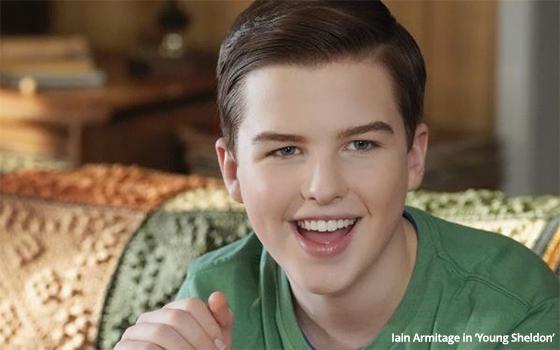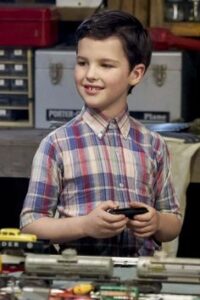
Things Only Adults Notice In Young Sheldon (Part 2)
Plenty of plot holes
Any time you have a spin-off series from a wildly popular show — especially when it’s long-running, and boasts a dedicated following — it opens up the potential for serious story problems. Throw in the fact that “Young Sheldon” is a prequel, and that the franchise’s fans just happen to be the same type who love scrutinizing even the most minute details, and it’s practically a spawning ground for plot holes. Younger audiences may not spot the most obvious ones, but rest assured adults watching both shows are rolling their eyes with regularity.
We know this because fans online have noticed plot holes you could drive a truck through. A big one comes in Season 3 when little Sheldon meets Dr. Stephen Hawking while on a trip to Pasadena in the appropriately titled “Pasadena.” Though the episode does cleverly foreshadow Sheldon’s future at CalTech, his meeting with Dr. Hawking directly contradicts a 2012 episode of “The Big Bang Theory” — in which Hawking made a cameo appearance as himself — where he supposedly met the renowned physicist for the first time.
But the Dr. Hawking snafu was hardly the end of the continuity problems. We could fill an entire article just pointing out the timeline discrepancies created by “Young Sheldon.” Kids may not notice, or even care, but devoted adult fans have been kicking up a fuss for years.
When the continuity is on-point

Despite all the plot holes that audiences have pointed out since “Young Sheldon” began, with some events outright conflicting with “The Big Bang Theory,” it’s far more often in line with what we’ve seen before, and sometimes in surprising ways. And when continuity is on point, it’s something only the most astute adult observers are likely to notice. Thankfully, there’s no shortage of eagle-eyed fans, and places like Reddit are rife with viewers pointing out the subtle ways when “Young Sheldon” has lined up perfectly with its predecessor.
In addition to foreshadowing Sheldon’s future in California, the show has featured stories that follow directly from minor elements in “The Big Bang Theory” that were related to his childhood. Even beyond the bigger elements like the presence of his mother, brother, and sister, who were seen years later in the other series, there are some events in “Young Sheldon” that actually explain a lot of what we saw in the show’s predecessor. For example, we finally learn just why the older Sheldon Cooper can never bring himself to use the word “sex,” as well as the origin of his catchphrase “bazinga.”
Likewise, we hear Sheldon’s mother singing him a song when he’s sick. Adult fans may have noticed that it’s the same ones his friends sing years later to remind him of when he was sick as a child under his mother’s care.
Georgie is more responsible than he seems

Starting back in “The Big Bang Theory,” Sheldon’s older brother George Jr. (played there by Jerry O’Connell) was the slacker of the family. He was portrayed as something of a slob, and downright irresponsible, which naturally makes his relationship with his fastidious, uptight brother Sheldon a difficult one. While their relationship shown years earlier in “Young Sheldon” is just as complicated, George Jr. here (played by Montana Jordan, whose resemblance to O’Connell has only gotten more striking as he’s aged) remains portrayed as some kind of delinquent.
Adults may have noticed, though, that this isn’t really the truth. When you take a step back, you may realize that George Jr. isn’t actually all that bad. While he does wind up dropping out of high school, he’s much more responsible than his reputation suggests. During the course of the series, he holds down a job as a teenager, saves up for and purchases his own car, and isn’t really as ill-behaved as you’d think for someone often thought of as the “bad kid.” Nevertheless, his own family and friends paint him as a problem child, mocking him for being “stupid” and sometimes even bullying him. His own father has treated him like a bad seed, and this can give audiences the impression that he really is a hard-luck case. But adults watching surely understand it’s a lot more complicated, and that the problem may lie with those around him.
George and Mary’s marriage isn’t peachy
Anyone who has ever been in one knows that marriage is rarely the bliss that pop culture would have us believe. At its best moments, even a good marriage takes work and must overcome rough patches. On “Young Sheldon,” adult viewers have probably noticed that the relationship between Mary and George Sr. isn’t an easy one, and often faces serious problems. Though there had been hints of this in “The Big Bang Theory,” the spin-off prequel sheds totally new light on the marriage of Sheldon’s parents, which we already knew included infidelity.
Years before “The Big Bang Theory,” we discover that mother Mary isn’t quite the innocent party. Often domineering, at times judgmental and self-righteous, Mary is no longer the favorite of audiences she once was. Likewise, father George’s frustrations with his wife become more sympathetic, even if we still don’t condone his future unfaithfulness.
Far from the typical happily married sitcom couple, the Coopers contend with real problems, though they’re not without their quiet and endearing moments too. Still, it becomes clear throughout the series that they may not be the best match, and the fact that they were only married because Mary got pregnant suggests that they may never have ended up together any other way.
Sheldon isn’t as innocent as he seems
It’s easy to think that the quiet, often aloof little Sheldon in “Young Sheldon” is the goody-two-shoes kid that the show’s marketing makes him out to be. Played by the charming child actor Iain Armitage — who debuted on the series when he was just nine years old, Sheldon looks the part of the kind, innocent, wide-eyed prodigy. But adults may sense by looking a little closer that Sheldon isn’t quite as innocent as he seems.
As an adult, much of Sheldon’s egotistical attitude is chalked up to what is suggested was an isolated childhood where he received very little guidance about social norms. But as some fans have pointed out online, “Young Sheldon” shows us that simply wasn’t the case, and it even makes little Sheldon out to be something of a jerk already. Whether it’s his casually misanthropic nature or condescending attitude towards others he deems beneath him, he can be awful to people, even if it’s portrayed as an endearing character quirk.
A meta-mention of Missy’s mistreatment
We learned in “The Big Bang Theory” that Sheldon Cooper had a fraternal twin sister Missy who is everything that Sheldon is not: fun-loving, outgoing, and foul-mouthed. When “Young Sheldon” was first announced, some probably assumed that Missy would play a key role, a constant foil to Iain Armitage’s younger version of Sheldon. Yet, when the series kicked off, though, Missy (Raegan Revord) rarely factored as heavily into the story as fans may have wanted, and some of those fans weren’t happy.
Adults noticed, though, that when she did begin to play a bigger role, getting stories of her own, the writers seemed to be addressing fans’ complaints, even incorporating them into the story. Because Missy makes a big turn in her Season 6 arc, becoming something of a teenaged rebel more like the Missy we’d remembered on “TBBT,” and her motivation is the very fact that her parents — like the show — too often overlooked her. It’s not something younger audiences probably picked up on, but for adults, it served as a kind of meta-commentary on the show itself.
A future tragedy looms over the family
As we’ve seen, “Young Sheldon” is about much more than just Sheldon Cooper, the super-smart kid who grows up to become the socially awkward adult in “The Big Bang Theory.” With a broad ensemble cast, the series focuses as much on the rest of the Cooper family as it does on Sheldon, with the troubles of Mary and George Sr., and the problems of George Jr. and Missy often taking center stage from episode to episode. But while the show is frequently a heartwarming, upbeat affair, there’s one milestone event in Sheldon’s life that casts a pall over the entire series.
Those adults in the audience who’ve seen “The Big Bang Theory” will surely remember that as an adult, Sheldon has talked about the death of his father when he was just 14 as a traumatic moment in his young-adult life. Now, flashing back to Sheldon’s early days growing up as a pre-teen, we see his father George Sr. – good but flawed — knowing that he doesn’t have much longer to live. In fact, the Season 6 premiere foreshadows the impending tragedy to those who are familiar, with an emotional moment between George Sr. and Sheldon’s brother George Jr.
With Season 7, Sheldon will reach his 14th birthday, and adult fans are already bracing for a very special — and quite heartbreaking — episode.
It’s a very different show that stands on its own
We’ve already covered how adults probably recognize “Young Sheldon” as a dramatic family story and not a broad kids’ comedy. But in truth, it has less in common even with “The Big Bang Theory” than audiences probably anticipated. While that series was known for its multi-camera, laugh-track-filled vibe, with wall-to-wall zaniness and eccentric characters, “Young Sheldon” feels almost the exact opposite.
Comedy is still front and center in “Young Sheldon,” but it’s less about visual gags goofiness and one-liners, with more well-crafted wit and smart humor than it typically gets credit for. It also eschews the live audience and stock laugh soundtrack, going for a single-camera set-up that gives it much more in common with more adult-oriented comedies like “30 Rock,” “New Girl,” and “Community.”
But it goes beyond merely being different than “The Big Bang Theory,” because “Young Sheldon” very much stands on its own. Fans who’ve watched “The Big Bang Theory” may get more out of it than those that didn’t, but audiences can sit down and watch the series without any knowledge of the other show, and enjoy it as much or more.
Adults finally know where Sheldon got his smarts from
During the 12 years that “The Big Bang Theory” ran on CBS, we didn’t learn all that much about Sheldon’s family. We knew he had two siblings, and his mother appeared a handful of times. One thing we never did learn, though, is the source of Sheldon Cooper’s extraordinary intelligence. His mother — while shrewd — was no genius, and when “Young Sheldon” began, it was clear that he didn’t get his genius from his father either. So, where did it come from? Well, adults who were paying close attention probably put a few clues together and figured out just where he got it from.
In a “Big Bang Theory” Christmas episode, Sheldon wishes he could have his grandfather back, as they clearly shared a close relationship. Flash forward (or backward, more appropriately) to “Young Sheldon,” and while his grandfather is already gone by that point in his life, we do learn that Pop-Pop introduced him to the works of sci-fi author Isaac Asimov (author of “Foundation”). This strongly suggests that Pop-Pop was an intellectual — and an early geek — and that’s where he inherited his mighty brain from.
Georgie’s relationship with Mandy isn’t cool
Later on in “Young Sheldon,” when the kids have begun growing up, they start getting involved in more teenage affairs. For Sheldon, that means going off to middle school and eventually high school, but for George Jr. that means getting a girlfriend. And that brings the introduction of Mandy (Emily Osment), a woman he meets at Meemaw’s laundromat. The problem with their relationship, though, is that Georgie is just 17 — and yet tells her that he’s 21 — while Mandy is actually 29 … and tells him that she’s 26, fodder for a humorous misunderstanding. Eventually, the truth comes out, but they still embark on a romantic relationship despite the age difference. Down the line, it’s revealed that Georgie has gotten Mandy pregnant.
While it’s true that the episode doesn’t entirely gloss over the large age gap between Georgie and Mandy, adults might be a little more weirded out by it than younger audiences. Why? Because while it may technically be legal depending on where you live, and the relationship itself doesn’t seem too unhealthy, there’s something undeniably odd and even a little creepy about a nearly thirtysomething woman romantically involved with an underage high school student — even if, and perhaps especially if — he isn’t enrolled in school anymore. And when Mandy winds up getting pregnant and having a baby, it just gets even more uncomfortable.